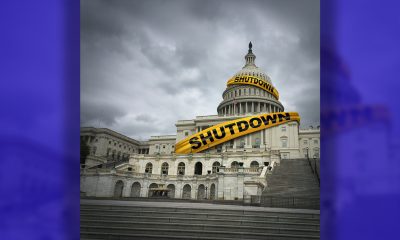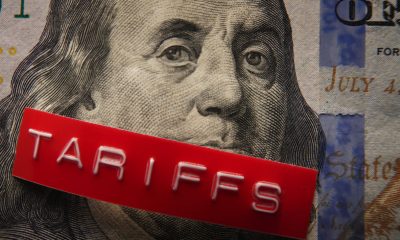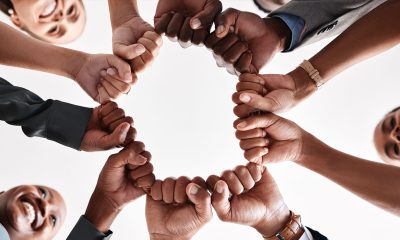Business
AP-GfK Poll: Most Americans Favor a Higher Minimum Wage

In this Nov. 20, 2014, file photo, supporters of legislation that will raise the minimum wage in Illinois rally outside the Illinois State Capitol in Springfield Ill. Most Americans support increasing the minimum wage, as well as requiring employers to provide paid sick leave and parental leave, according to a new Associated Press-GfK poll. Proposals to increase the federal minimum wage, as well as to require employers to give paid leave to their employees, find few objections among Americans as a whole. (AP Photo/Seth Perlman, File)
EMILY SWANSON, Associated Press
WASHINGTON (AP) — Most Americans support increasing the minimum wage, as well as requiring employers to provide paid sick leave and parental leave, according to a new Associated Press-GfK poll.
All three were proposed by President Barack Obama during his recent State of the Union address as ways to increase protections for American workers. But the poll also found that most Americans don’t approve of the job Obama is doing helping the middle class.
Here are five things to know about public opinion on Obama’s workplace proposals:
___
PAID SICK LEAVE AND HIGHER WAGES GET STRONG SUPPORT
Proposals to increase the federal minimum wage, as well as to require employers to give paid leave to their employees, find few objections among Americans as a whole.
Six in 10 Americans favor raising the minimum wage, including nearly half who are strongly in favor, the AP-GfK Poll shows, while only 2 in 10 are opposed. Six in 10 also favor requiring all employers to give paid time off to employees when they are sick, while two-thirds favor requiring all employers to give time off to employees after the birth of a child.
Among Republicans, about half support requiring employers to give paid sick leave and 55 percent support a requirement for paid parental leave.
But the minimum wage divides Republicans more closely, with only 4 in 10 in favor, 31 percent opposed and 27 percent not leaning either way. Half of moderate-to-liberal Republicans, but just a third of conservative Republicans, favor a minimum wage increase.
About 8 in 10 Democrats and a majority of independents favor each of these workplace proposals.
___
MOST DISAPPROVE OF OBAMA’S HANDLING OF MIDDLE CLASS, POOR
Obama’s workplace proposals were part of a set of measures he says will help strengthen the middle class. Most Americans see that as a valuable goal, with 72 percent saying the government does too little to help the middle class. Slightly fewer — about 6 in 10 — say the government does too little to help the poor, and more than half think too little is done to help the unemployed.
(Two-thirds say the government is doing too much to help the wealthy.)
Those who think the government isn’t doing enough to help the middle class or the poor are especially likely to support raising the minimum wage and requiring companies to offer paid leave.
But the poll finds most Americans disapprove of how Obama is handling helping both groups. Still, the poll finds Americans tend to trust Democrats over Republicans to help the middle class by nearly a 2-to-1 margin, and trusted Democrats over the GOP to help the poor by a nearly 3-to-1 margin.
___
FEWER SEE NEED FOR NEW GENDER EQUALITY LAWS
Forty-eight percent of Americans think current laws to ensure that men and women are treated equally in the workplace are about right, more than the 41 percent who think the government needs to enact more laws to ensure equal treatment. Another 7 percent would repeal existing laws.
Nearly half of women (48 percent) say the government needs more laws to ensure workplace equality between men and women, but only 35 percent of men say the same.
___
GENDER DIVIDES DEMOCRATS, MODERATES
Among Republicans, men and women are about equally unlikely to support additional workplace equality laws, with more than 6 in 10 Republicans of both men and women saying current laws are about right.
But among Democrats, women are more supportive of new workplace equality laws than men, 66 percent to 49 percent. Overall, about 6 in 10 Democrats say new laws are necessary.
Among those who consider themselves political moderates, too, there is a gender gap on the issue, with 53 percent of moderate women and only 32 percent of moderate men saying new laws are necessary.
___
MAJORITY FAVOR FREE COMMUNITY COLLEGE
More than half of Americans — 56 percent — favor a plan put forward by Obama for the government to pay for community college for any student who maintains a certain grade point average and makes progress toward earning a degree, the AP-GfK poll shows. Three-quarters of Democrats, half of independents and a third of Republicans favor the proposal.
Nearly half of moderate and liberal Republicans, but only 3 in 10 conservative Republicans, are in favor of the community college proposal.
Nearly 6 in 10 Americans think the government doesn’t do enough to help students, the poll found.
___
The AP-GfK Poll of 1,045 adults was conducted online Jan. 29-Feb. 2, using a sample drawn from GfK’s probability-based KnowledgePanel, which is designed to be representative of the U.S. population. The margin of sampling error for all respondents is plus or minus 3.5 percentage points.
Respondents were first selected randomly using phone or mail survey methods, and later interviewed online. People selected for KnowledgePanel who didn’t otherwise have access to the Internet were provided access at no cost to them.
___
Online:
AP-GfK poll: http://www.ap-gfkpoll.com
Copyright 2015 The Associated Press. All rights reserved. This material may not be published, broadcast, rewritten or redistributed.
Activism
Oakland Post: Week of December 31, 2025 – January 6, 2026
The printed Weekly Edition of the Oakland Post: Week of – December 31, 2025 – January 6, 2026

To enlarge your view of this issue, use the slider, magnifying glass icon or full page icon in the lower right corner of the browser window.
Activism
Big God Ministry Gives Away Toys in Marin City
Pastor Hall also gave a message of encouragement to the crowd, thanking Jesus for the “best year of their lives.” He asked each of the children what they wanted to be when they grow up.

By Godfrey Lee
Big God Ministries, pastored by David Hall, gave toys to the children in Marin City on Monday, Dec. 15, on the lawn near the corner of Drake Avenue and Donahue Street.
Pastor Hall also gave a message of encouragement to the crowd, thanking Jesus for the “best year of their lives.” He asked each of the children what they wanted to be when they grew up.
Around 75 parents and children were there to receive the presents, which consisted mainly of Gideon Bibles, Cat in the Hat pillows, Barbie dolls, Tonka trucks, and Lego building sets.
A half dozen volunteers from the Big God Ministry, including Donnie Roary, helped to set up the tables for the toy giveaway. The worship music was sung by Ruby Friedman, Keri Carpenter, and Jake Monaghan, who also played the accordion.
Big God Ministries meets on Sundays at 10 a.m. at the Mill Valley Community Center, 180 Camino Alto, Mill Valley, CA Their phone number is (415) 797-2567.
Activism
First 5 Alameda County Distributes Over $8 Million in First Wave of Critical Relief Funds for Historically Underpaid Caregivers
“Family, Friend, and Neighbor caregivers are lifelines for so many children and families in Alameda County,” said Kristin Spanos, CEO, First 5 Alameda County. “Yet, they often go unrecognized and undercompensated for their labor and ability to give individualized, culturally connected care. At First 5, we support the conditions that allow families to thrive, and getting this money into the hands of these caregivers and families at a time of heightened financial stress for parents is part of that commitment.”

Family, Friend, and Neighbor Caregivers Can Now Opt Into $4,000 Grants to Help Bolster Economic Stability and Strengthen Early Learning Experiences
By Post Staff
Today, First 5 Alameda County announced the distribution of $4,000 relief grants to more than 2,000 Family, Friend, and Neighbor (FFN) caregivers, totaling over $8 million in the first round of funding. Over the full course of the funding initiative, First 5 Alameda County anticipates supporting over 3,000 FFN caregivers, who collectively care for an estimated 5,200 children across Alameda County. These grants are only a portion of the estimated $190 million being invested into expanding our early childcare system through direct caregiver relief to upcoming facilities, shelter, and long-term sustainability investments for providers fromMeasure C in its first year. This investment builds on the early rollout of Measure C and reflects a comprehensive, system-wide strategy to strengthen Alameda County’s early childhood ecosystem so families can rely on sustainable, accessible care,
These important caregivers provide child care in Alameda County to their relatives, friends, and neighbors. While public benefits continue to decrease for families, and inflation and the cost of living continue to rise, these grants provide direct economic support for FFN caregivers, whose wages have historically been very low or nonexistent, and very few of whom receive benefits. As families continue to face growing financial pressures, especially during the winter and holiday season, these grants will help these caregivers with living expenses such as rent, utilities, supplies, and food.
“Family, Friend, and Neighbor caregivers are lifelines for so many children and families in Alameda County,” said Kristin Spanos, CEO, First 5 Alameda County. “Yet, they often go unrecognized and undercompensated for their labor and ability to give individualized, culturally connected care. At First 5, we support the conditions that allow families to thrive, and getting this money into the hands of these caregivers and families at a time of heightened financial stress for parents is part of that commitment.”
The funding for these relief grants comes from Measure C, a local voter-approved sales tax in Alameda County that invests in young children, their families, communities, providers, and caregivers. Within the first year of First 5’s 5-Year Plan for Measure C, in addition to the relief grants to informal FFN caregivers, other significant investments will benefit licensed child care providers. These investments include over $40 million in Early Care and Education (ECE) Emergency Grants, which have already flowed to nearly 800 center-based and family child care providers. As part of First 5’s 5-Year Plan, preparations are also underway to distribute facilities grants early next year for child care providers who need to make urgent repairs or improvements, and to launch the Emergency Revolving Fund in Spring 2026 to support licensed child care providers in Alameda County who are at risk of closure.
The FFN Relief Grants recognize and support the essential work that an estimated 3,000 FFN caregivers provide to 5,200 children in Alameda County. There is still an opportunity to receive funds for FFN caregivers who have not yet received them.
In partnership with First 5 Alameda County, Child Care Payment Agencies play a critical role in identifying eligible caregivers and leading coordinated outreach efforts to ensure FFN caregivers are informed of and able to access these relief funds.FFN caregivers are eligible for the grant if they receive a child care payment from an Alameda County Child Care Payment Agency, 4Cs of Alameda County, BANANAS, Hively, and Davis Street, and are currently caring for a child 12 years old or younger in Alameda County. Additionally, FFN caregivers who provided care for a child 12 years or younger at any time since April 1, 2025, but are no longer doing so, are also eligible for the funds. Eligible caregivers are being contacted by their Child Care Payment Agency on a rolling basis, beginning with those who provided care between April and July 2025.
“This money is coming to me at a critical time of heightened economic strain,” said Jill Morton, a caregiver in Oakland, California. “Since I am a non-licensed childcare provider, I didn’t think I was eligible for this financial support. I was relieved that this money can help pay my rent, purchase learning materials for the children as well as enhance childcare, buy groceries and take care of grandchildren.”
Eligible FFN caregivers who provided care at any time between April 1, 2025 and July 31, 2025, who haven’t yet opted into the process, are encouraged to check their mail and email for an eligibility letter. Those who have cared for a child after this period should expect to receive communications from their child care payment agency in the coming months. FFN caregivers with questions may also contact the agency they work with to receive child care payments, or the First 5 Alameda help desk, Monday through Friday, from 9 a.m. to 5:00 p.m. PST, at 510-227-6964. The help desk will be closed 12/25/25 – 1/1/26. Additional grant payments will be made on a rolling basis as opt-ins are received by the four child care payment agencies in Alameda County.
Beginning in the second year of Measure C implementation, FFN caregivers who care for a child from birth to age five and receive an Alameda County subsidized voucher will get an additional $500 per month. This amounts to an annual increase of about $6,000 per child receiving a subsidy. Together with more Measure C funding expected to flow back into the community as part of First 5’s 5-Year Plan, investments will continue to become available in the coming year for addressing the needs of childcare providers in Alameda County.
About First 5 Alameda County
First 5 Alameda County builds the local childhood systems and supports needed to ensure our county’s youngest children are safe, healthy, and ready to succeed in school and life.
Our Mission
In partnership with the community, we support a county-wide continuous prevention and early intervention system that promotes optimal health and development, narrows disparities, and improves the lives of children from birth to age five and their families.
Our Vision
Every child in Alameda County will have optimal health, development, and well-being to reach their greatest potential.
Learn more at www.first5alameda.org.
-

 Bay Area3 weeks ago
Bay Area3 weeks agoPost Salon to Discuss Proposal to Bring Costco to Oakland Community meeting to be held at City Hall, Thursday, Dec. 18
-

 Activism3 weeks ago
Activism3 weeks agoMayor Lee, City Leaders Announce $334 Million Bond Sale for Affordable Housing, Roads, Park Renovations, Libraries and Senior Centers
-

 Activism4 weeks ago
Activism4 weeks agoOakland Post: Week of December 10 – 16, 2025
-

 Activism3 weeks ago
Activism3 weeks agoOakland School Board Grapples with Potential $100 Million Shortfall Next Year
-

 Arts and Culture3 weeks ago
Arts and Culture3 weeks agoFayeth Gardens Holds 3rd Annual Kwanzaa Celebration at Hayward City Hall on Dec. 28
-

 Activism3 weeks ago
Activism3 weeks ago2025 in Review: Seven Questions for Black Women’s Think Tank Founder Kellie Todd Griffin
-

 Advice3 weeks ago
Advice3 weeks agoCOMMENTARY: If You Don’t Want Your ‘Black Card’ Revoked, Watch What You Bring to Holiday Dinners
-

 Activism3 weeks ago
Activism3 weeks agoAnn Lowe: The Quiet Genius of American Couture


























































